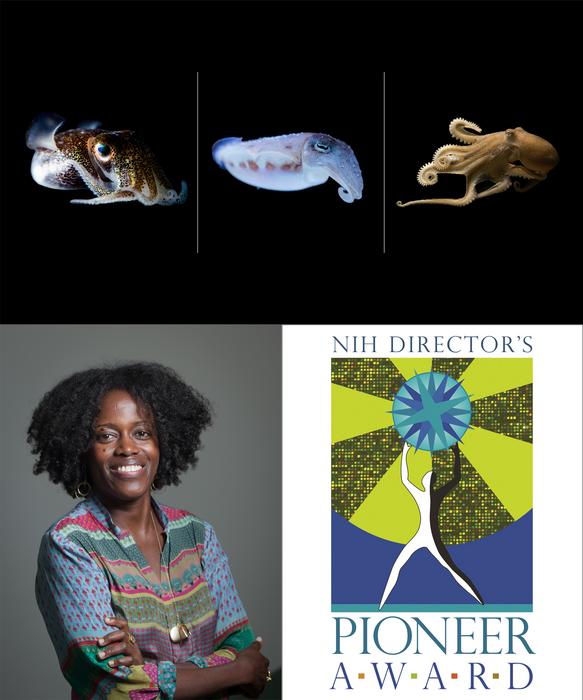NEW YORK, Oct. 3, 2023 — Mandë Holford, a professor in the Chemistry and Biochemistry departments at Hunter College and The City University of New York Graduate Center (CUNY Graduate Center), has won a National Institutes of Health Common Fund Pioneer Award for her trailblazing research exploring the therapeutic opportunities and properties of venoms from cephalopods and other marine mollusks. Holford received one of eight Pioneer Awards granted in 2023, which will total more than $47.7 million over five years.

Credit: Bret Grasse
NEW YORK, Oct. 3, 2023 — Mandë Holford, a professor in the Chemistry and Biochemistry departments at Hunter College and The City University of New York Graduate Center (CUNY Graduate Center), has won a National Institutes of Health Common Fund Pioneer Award for her trailblazing research exploring the therapeutic opportunities and properties of venoms from cephalopods and other marine mollusks. Holford received one of eight Pioneer Awards granted in 2023, which will total more than $47.7 million over five years.
This is the first time a CUNY faculty member has received the NIH Director’s Pioneer Award. It will provide $5.5 million over five years to conduct research and to fund postdoctoral, graduate, and undergraduate student researchers in Holford’s laboratories.
“The NIH Pioneer Award provides resources that will allow my team to go where science takes us and ask really bold questions,” Holford said. “Studying the evolutionary genetics of venom development in cephalopods such as squids, cuttle fish, and octopuses opens the door to discoveries that can have transformative effects on fundamental science and disease research by enabling drug discoveries that broadly bolster the NIH’s mission of enhancing human health.”
Established in 2004, the Pioneer Award enables investigators to pursue high-risk, high-reward research leading to breakthroughs in biomedical or behavioral science. Holford and her team will use the funds to pursue a new direction for venom research that could benefit developmental cellular and molecular biology, as well as drug discovery and development. Their study of cephalopods will provide the tools and models for tackling biological and translational questions about venoms in living organisms.
Venom production is a complex trait that has evolved in more than 200,000 creatures representing some 15% to 30% of animals. Thus, studying its evolution has broad applications for science, including understanding the development of similar tissues, the origins of novel genes, and the molecular mechanisms behind the regulation and expression of bioactive compounds.
But the most exciting applications for venoms may be in medicine. Venom-derived therapeutics now treat a number of conditions, including diabetes, heart disease, and pain, but the full potential of venom for medicine and biology remains untapped.
“We have just scratched the surface of venom research,” said Holford, whose group was the first to identify the utility of terebrid mollusk venom peptides in mitigating pain and suppressing tumors. “We need model systems to revolutionize the study of venom gland biology so that we can radically transform how we generate, manipulate, and use venom arsenals.”
About Hunter College
Located in the heart of Manhattan, Hunter is the largest college in the City University of New York (CUNY) system. Founded in 1870, it is also one of the oldest public colleges in the country and famous for a student body that is as diverse as the city itself. Most Hunter students are the first in their families to attend college and many go on to top professional and graduate programs, winning Rhodes and Fulbright scholarships, Mellon fellowships, National Institutes of Health grants, and other competitive honors. More than 23,000 students attend Hunter, pursuing undergraduate and graduate degrees in more than 170 areas of study. The 1,700 full- and part-time members of Hunter’s faculty are unparalleled. They receive prestigious national grants, contribute to the world’s leading academic journals, and play major roles in cutting-edge research. They are fighting cancer, formulating public policy, expanding our culture, enhancing technology, and more.
About The City University of New York Graduate Center
The CUNY Graduate Center is a leader in public graduate education devoted to enhancing the public good through pioneering research, serious learning, and reasoned debate. The Graduate Center offers ambitious students nearly 50 doctoral and master’s programs of the highest caliber, taught by top faculty from throughout CUNY — the nation’s largest urban public university. Through its nearly 40 centers, institutes, initiatives, and the Advanced Science Research Center, the Graduate Center influences public policy and discourse and shapes innovation. The Graduate Center’s extensive public programs make it a home for culture and conversation.




